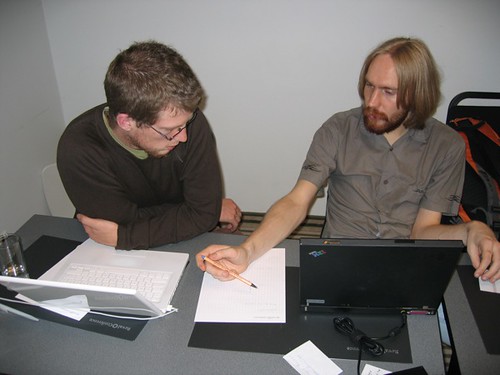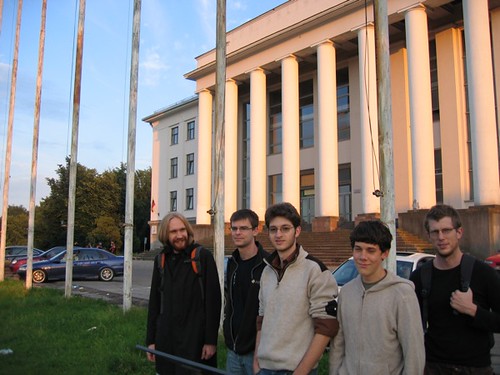At EuroPython I had the pleasure of meeting for the first time and working all week with two SchoolTool contributors, Brian Sutherland (pictured below at left, with SchoolTool lead developer Ignas Mikalajūnas) and Andrew Rodriguez.

Brian, a South African/German living in Spain, has been the volunteer release manager for SchoolTool, specializing in Debian/Ubuntu packaging, for the past couple years. We've been in touch via IRC and email practically every week during that time, but this was the first time we've met. He is really the only volunteer to have a substantial ongoing commitment to the project, and we've even started paying him a bit every month to act as the sys admin for our servers. The primarly goal for this sprint was packaging a release for Ubuntu Gutsy (due out in October), so Brian had a central role in the sprint.
Packaging this version was particularly difficult, because we have started using several Zope 3 components (what's the point of using an open source component architecture if you don't reuse other people's components?) that don't themselves have Debian packages, which means that in addition to getting SchoolTool's packages to work, Brian had to package about a dozen external components. It is tedious work in the extreme, but he doggedly pursued it to completion.

On the way to Vilnius, I realized that I didn't have the slightest idea of what my responsibility to or for Andrew Rodriguez (above, with Zeppelins) was. I knew that he was a CanDo developer who was spending the summer in Spain, and Jeff Elkner had arranged for him to be put on a plane to Vilnius for the week and he'd be landing about an hour after me, but not much beyond that. For example, if he was kidnapped, smuggled across the border to Belorussia and sold into white slavery in Minsk, would it be my fault?
As it turned out, I never had to find the answer to that question, because Andrew behaved as impeccably as a 15 year old hacker dropped into a refurbished Soviet conference center for a week could possibly be expected to. The Reval Hotel Lietuva and its immediate surroundings is comical in its range of distractions for a 15 year old (Lithuanians still value their freedom). There is a casino in the basement, a strip club (pictured below) about 100 feet in from of the front door, a skate park about 100 yards away, a couple malls across the street. The only thing that is missing is an Amsterdam-style coffee house. Luckily, none of this turned out to be a problem.

Open source conferences like EuroPython are strictly come-as-you-are affairs. The attending geeks are, I suppose, in many ways a homogeneous group, but have nonetheless all arrived by idiosyncratic paths. The whole week I never saw a single person question Andrew's presence, or, for that matter, comment in any way on the fact that he was the only minor in attendance. It was refreshing. Andrew maintained the same pleasantly bemused affect throughout.
Andrew also turns out to be a talented programmer, blessed with patience beyond his years. He and I worked together to clear up a big pile of small user interface annoyances and bugs that I'd been dying to clean up in SchoolTool, but couldn't quite handle by myself. I'm very happy he'll have two more years to work with us and CanDo while in high school, and I hope we can keep him engaged in the project.
Of course, the rest of the team did great work as well. Pictured below from left to right, Ignas, Jean-Francois Roche, CanDo lead developer Paul Carduner, Andrew and Brian. Thanks for a great sprint, guys!





